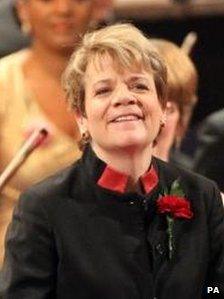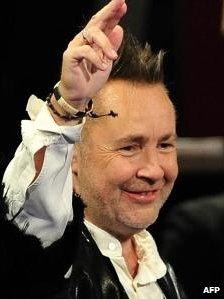Last Night of the Proms conductor Marin Alsop: 'It's a girl!'
- Published

Alsop is a former pupil of Leonard Bernstein, whose music she conducted at the Proms finale
This weekend saw New Yorker Marin Alsop become the first woman to lead the Last Night of the Proms in its 118-year history.
Alsop has admitted being "quite shocked that it can be 2013 and there can still be firsts for women".
The music director of Baltimore Symphony Orchestra since 2007, and principal conductor of Brazil's Sao Paulo Symphony Orchestra, she has been hailed for her bold attempts to make classical music more inclusive, defying boundaries of class, age and gender.
The day after conducting Britain's best-loved musical extravaganza in front of a crowd of more than 6,000, Alsop spoke to the BBC about the Proms, patriotism, and those pink balloons.
You appeared visibly moved at last night's performance, was it what you expected?
It exceeded my expectations. It was a great evening. It was really emotional and very moving to be involved in such a big celebration.
What makes the Proms such a unique event in the world of classical music?
I think it's the number of people that gather and watch, from the parks and that. Everyone comes with the expectation that it's going to be great evening and it's so nice to have everyone coming from such a positive vantage point.
Speaking at the Proms last night, you alluded to opposition you faced to becoming a conductor, tell me more about that.
When I was a kid my violin teacher told me girls couldn't do that. She simply didn't see it.
To a certain degree I have met opposition, spoken or unspoken, all the way through. I think every woman in a position of authority will tell you that opposition exists somewhere in the mix, whether it's conscious or unconscious, because we're not accustomed as a society [to having a female in charge].
Does gender make any difference to the role of conductor?
I have no idea if being female makes any difference. I have no perspective on it, I have only been me.

The Proms also marked the first time Alsop had worked with fellow American Joyce DiDonato
Could it affect the relationship between conductor and orchestra?
Not at all. I think the orchestra just wants someone knowledgeable and committed. They don't really care, as long as you're good.
How much time did you have to rehearse with the BBC symphony orchestra?
We didn't have that much time. We started rehearsing Thursday afternoon - just two days. It makes it very exciting.
The Proms finale is traditionally very patriotic. As an American, how did it feel to be at the centre of it?
I feel very much at home here, I like all the tradition and that kind of hoopla.
So you don't think we are a bunch of flag-waving loons?
I didn't say that...! But I enjoy it. I think there is something very dear about it all.
What about the pink balloons which were tied around the hall, were they for your benefit?
I assume so - they said 'it's a girl!'
Nigel Kennedy burst one with his bow right in front of you. How was your first experience of working with him?
The balloon was a little bit alarming. It was fun to work together, we really enjoyed it. I thought we had a great rapport, a great connection.
Would you consider replicating the Proms in Baltimore or Sao Paulo?
This is a uniquely British experience. Imitating things doesn't necessarily bring out the best.

Nigel Kennedy was one of the soloists at Saturday's extravaganza
It's the morning after the night before and you are en route back to the States. Where do you find the energy?
I don't have much of it this morning. I am hoping to regroup on the plane.
What do you do to relax?
I love to run, work out a little bit, read, I'm studying Portuguese… I've got a full plate.
Do you listen to music, or is that too much like work?
Absolutely not.
What do you see as your legacy?
I don't care much about legacies. To me it's all about trying to maximise whatever you are doing in the moment, and make a difference wherever you are.
- Published7 September 2013
- Published7 September 2013
- Published18 April 2013